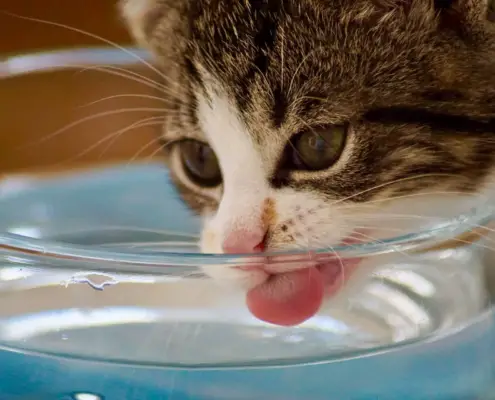
Bipolar disorder is a mental health condition that affects millions of people worldwide. It is characterized by extreme mood swings, ranging from manic highs to depressive lows. But what about cats? Can they experience the same kind of mental health issues as humans? The answer to this question is not straightforward. While some experts believe that cats can indeed be bipolar, others are skeptical. In this article, we will explore the possibility of cats being bipolar and look at the signs, symptoms, and factors that may contribute to bipolar-like behavior in cats.
Understanding Bipolar Disorder in Humans
Before delving into the possibility of cats being bipolar, it is important to understand what bipolar disorder is and how it affects humans. Bipolar disorder, also known as manic depression, is a mental health condition that affects a person’s mood, energy, and ability to function. It is characterized by episodes of mania or hypomania (a less severe form of mania) and depression.
During a manic episode, a person may experience:
- Increased energy, activity, and restlessness
- Racing thoughts and speech
- Grandiosity or inflated self-esteem
- Decreased need for sleep
- Impulsivity and risky behavior
During a depressive episode, a person may experience:
- Persistent feelings of sadness, hopelessness, and worthlessness
- Loss of interest in activities once enjoyed
- Changes in appetite and sleep patterns
- Fatigue and lack of energy
- Suicidal thoughts
Bipolar disorder is a chronic condition that requires ongoing treatment and management. It can be treated with medications, psychotherapy, and lifestyle changes.
Can Cats Experience Mental Health Issues?
While it is clear that humans can experience mental health issues, the question of whether cats can is less straightforward. There is limited research on the topic, and opinions among experts vary. Some veterinarians and animal behaviorists believe that cats can experience mental health issues similar to humans, while others are skeptical.
One reason for the lack of research is that it can be difficult to diagnose mental health issues in cats. Unlike humans, cats cannot communicate their thoughts and feelings verbally, making it challenging to determine if they are experiencing mood swings or other symptoms of mental illness. Additionally, cats may exhibit different symptoms than humans, making it challenging to compare their behavior to that of humans with bipolar disorder.
The Debate: Can Cats Really Be Bipolar?
The question of whether cats can be bipolar is a contentious one. Some experts believe that cats can experience mood swings and other symptoms of bipolar disorder, while others are skeptical. One argument in favor of cats being bipolar is that their behavior can be unpredictable and erratic, similar to that of a person with bipolar disorder.
For example, a cat may go from being playful and affectionate to suddenly lashing out at their owner or hiding for hours on end. They may also exhibit excessive grooming behavior or seem unusually lethargic. These behaviors are similar to the mood swings experienced by people with bipolar disorder.
However, the counterargument is that cats are not capable of experiencing the complex range of emotions that humans do, making it unlikely that they can be bipolar. Additionally, the erratic behavior exhibited by cats could be due to other factors, such as illness or stress.
Signs and Symptoms of Bipolar-Like Behavior in Cats
While the debate continues, it is possible that some cats may exhibit bipolar-like behavior. Some signs and symptoms to look out for include:
- Extreme changes in behavior, such as going from being affectionate to aggressive
- Sudden changes in activity level, such as going from hyperactive to lethargic
- Excessive grooming or self-injury
- Changes in appetite and sleep patterns
- Litter box issues
- Destructive behavior, such as scratching furniture or walls
If you notice any of these behaviors in your cat, it is important to seek professional help.
Factors That May Contribute to Mood Swings in Cats
Several factors may contribute to mood swings in cats. These include:
- Stress: Cats can become stressed for many reasons, including changes in their environment, illness, or conflict with other animals in the household.
- Medical conditions: Certain medical conditions, such as hyperthyroidism or neurological disorders, can cause mood swings in cats.
- Medications: Some medications can cause side effects that affect a cat’s behavior and mood.
- Genetics: It is possible that some cats may be more prone to mood swings due to genetic factors.
Seeking Professional Help for Your Cat’s Behavior
If you suspect that your cat may be experiencing bipolar-like behavior or any other mental health issue, it is important to seek professional help. Talk to your veterinarian about your concerns and ask for a referral to an animal behaviorist or veterinary psychiatrist. These professionals can evaluate your cat’s behavior and recommend a treatment plan, which may include medication, therapy, or lifestyle changes.
It is important to note that not all veterinarians or animal behaviorists are trained in diagnosing and treating mental health issues in cats. Make sure to find a professional who has experience in this area.
Managing Mood Swings in Cats
If your cat is diagnosed with a mental health issue, there are several ways to manage their mood swings. These may include:
- Medication: Your veterinarian may prescribe medications to help manage your cat’s symptoms.
- Environmental changes: Making changes to your cat’s environment, such as providing more hiding spots or reducing stressors, can help manage their mood swings.
- Behavioral therapy: An animal behaviorist can work with you and your cat to modify their behavior and reduce their symptoms.
- Lifestyle changes: Making changes to your cat’s diet, exercise routine, and daily routine can help manage their mood swings.
It is important to work closely with your veterinarian and/or animal behaviorist to develop a treatment plan that is tailored to your cat’s specific needs.
Other Possible Explanations for Erratic Behavior in Cats
While it is possible that some cats may experience bipolar-like behavior, there are other possible explanations for erratic behavior in cats. These include:
- Illness: Some medical conditions can cause changes in behavior, such as lethargy or aggression.
- Aging: As cats age, they may experience changes in behavior and activity level.
- Environmental factors: Changes in the environment, such as a move to a new home or the addition of a new pet, can cause stress and changes in behavior.
It is important to rule out any underlying medical conditions or environmental factors before assuming that your cat is experiencing bipolar-like behavior.
Case Studies and Anecdotes: Real-Life Examples of Cats with Bipolar-Like Behavior
While there is limited research on the topic of cats and bipolar disorder, there are some anecdotal reports of cats exhibiting bipolar-like behavior. For example, there are reports of cats who go from being affectionate to suddenly biting or scratching their owners. Additionally, some cats may exhibit hyperactive behavior followed by periods of lethargy.
It is important to note that these reports are not scientific evidence of cats being bipolar. However, they do suggest that some cats may experience mood swings and other symptoms that are similar to those experienced by humans with bipolar disorder.
The Possibility of Cats Being Bipolar
In conclusion, while the question of whether cats can be bipolar is not straightforward, it is possible that some cats may experience mood swings and other symptoms similar to those experienced by humans with bipolar disorder. If you notice any changes in your cat’s behavior, it is important to seek professional help to rule out any underlying medical conditions or environmental factors. If your cat is diagnosed with a mental health issue, there are several ways to manage their symptoms, including medication, therapy, and lifestyle changes. While more research is needed on the topic, it is important to recognize that cats, like humans, can experience changes in behavior and mood that require professional attention.
If you are concerned about your cat’s behavior, talk to your veterinarian about your concerns and ask for a referral to an animal behaviorist or veterinary psychiatrist. Remember, early intervention is key to managing mental health issues in cats.
If you enjoyed my article, I would appreciate you sharing it with your network.

Sima Ndlebe
Sima writes for CatBuzz. He is interested in Cats, Health and Fitness, and Entrepreneurship.
Published: 16 November 2023
Related Articles
Disclaimer
The content found on CatBuzz.org is presented on an "as is" basis and is intended for general consumer information and education purposes only. Any utilization of this information is voluntary and solely at the user's own risk.
None of the articles or content should be regarded as, or used in place of, veterinary medical advice, diagnosis, or treatment. The information provided on the website is purely for educational and informational intentions and should not be considered a substitute for professional guidance from a veterinarian or other qualified expert. The articles are designed to inform consumers about veterinary healthcare and medical matters that may impact their cat's daily life. It should be noted that this website and its services do not constitute the practice of any form of veterinary medical advice, diagnosis, or treatment. CatBuzz.org explicitly disclaims any liability for any direct or indirect damages or losses that may arise from the use of or reliance on the information contained within the content.
Consumers must consult a veterinarian, veterinary specialist, or another qualified veterinary healthcare provider when seeking advice regarding their cat's health or medical conditions. It is important not to ignore, avoid, or postpone seeking medical advice from a veterinarian or other qualified veterinary healthcare provider solely based on information obtained from this website. If you believe that your cat may be experiencing a medical issue or condition, it is imperative to promptly contact a qualified veterinary healthcare professional.



